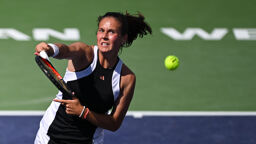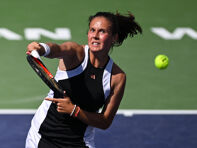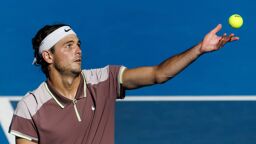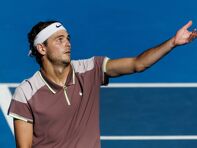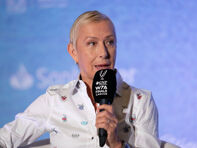Brian Vahaly has two main points to get across to Margaret Court: When it comes to same-sex parents, she doesn’t know what she is talking about and her words hurt.
“I think if she met little Parker and Bennett and actually came into our home, she would understand why her words were so hurtful to so many people,” Vahaly, a former men’s tennis Top 100 player, told Outsports about the twin boys he and his husband, Bill Jones, are raising. Parker and Bennett Jones Vahaly turn 1 on Wednesday.
Vahaly, 37, who retired from the sport 10 years ago and was ranked as high as No. 64 on the tour, was reacting to the anti-LGBT comments made numerous times by the Australian Court, 74, a tennis legend who won 24 titles.
In addition to opposing same-sex marriage, Court is also critical of same-sex parents, saying a child raised without a male and female parent would be “deprived.”
In addressing the birth of a child to tennis player Casey Dellacqua and her female partner, Court wrote in a letter to a newspaper:
“If we continue to dismantle the traditional family unit as old fashioned, archaic and no longer even necessary, we will create a fatherless generation.
“Indeed, the lines are becoming increasingly blurred as the march towards such partnerships, even gay marriage, is fueled by minority voices rising in opposition to respected Christian beliefs which many cultures believe.
“I simply want to champion the rights of the family over the rights of the individual to engineer social norms into their relationships.
“I really want to see a society where traditional family values are still celebrated and every child has the best possible start in life.”
Court’s comments about same-sex marriage — along with ones that had her equating LGBT people to practicing mind control tricks used by Hitler, communism and the devil — have stirred controversy among current and retired players, with many urging Tennis Australia to rename Margaret Court Arena, site of the Australian Open.
Vahaly first publicly discussed being gay a month ago on a podcast with Sports Illustrated senior writer and tennis expert Jon Wertheim. After he saw my write-up of Court’s comments, Vahaly agreed to discuss her remarks in the context of being a dad. “It is my background as a father that makes the Court article so troubling,” he said.
Vahaly is a venture capitalist, while Jones is a real estate agent. They live with Parker and Bennett in Annapolis, Maryland.
Q: Margaret Court is against same-sex marriage, and says, "I have nothing against gay people but a child needs a mother and a father and the first two chapters of the Bible are all about family." What would you like to say to Court about her views both as a dad and a gay man?
Vahaly: I would encourage Margaret to actually spend time with gay people who have families. Gay people do not just wake up with children. It’s a serious, intense, and exhausting experience that takes years and a lot money.
If there is one thing you must know — is that every child in the family of a gay couple is so incredibly loved and wanted. These kids have two parents who love them and are crazy about them.
Her insinuation about my little boys not being OK because they do not have a mother — well, I would ask her to share the data to support that claim.
In my experience, I have often found that most people who discriminate and stereotype people or families tend to lack first-hand knowledge. I think if she met little Parker and Bennett and actually came into our home, she would understand why her words were so hurtful to so many people.
Q: Do you think Margaret Court Arena needs to be renamed and if so, why?
Vahaly: I would be incredibly moved to see Tennis Australia take a stance on behalf of the gay and lesbian tennis players and remove Margaret’s name from the arena.
I would encourage them to think through the message they are sending if they allow this discrimination to stand. I will say that I have tremendous respect for what Margaret Court accomplished on the tennis court. But it’s a slap in the face to countless tennis players and tennis greats — Billie Jean King, Martina Navratilova, to name a few — who are expected to play on a court and be told their lives are equated to what Hitler did to children in Germany. It simply cannot be tolerated.
Q: Assume for the moment you were able to still be playing pro tennis — would you have an issue playing in an arena named for Margaret Court?
Vahaly: I played against Andre Agassi in the 2003 Australian Open in Margaret Court Arena. If I were still competing, I would have a difficult time playing on that court.
Q: Are you encouraged by current players speaking out about Court?
Vahaly: Seeing that the current No. 1 player in the world, Andy Murray, is speaking on behalf of gay and lesbian players is incredibly inspiring to watch. He has no reason to step into this discussion, but he is doing it because he knows it’s the right thing to do. Having the support of the No. 1 player speaks volumes.

Q: Had you always wanted children and was there a moment after realizing you were gay that you felt that being a dad was not possible and how did you cope with that?
Vahaly: Once I had come to terms with my sexuality in my late 20s, I did take the time to mourn that my life would likely be one without marriage or kids. Similar to sports, things do not always go your way and while its OK to be upset about it, at some point, you just have to move forward. I believe there is tremendous meaning to be had in a life, with or without children.
Q: How did you and your husband, Bill, come to the decision to have children?
Vahaly: Bill and I talked about having kids very early in our relationship. For Bill, it was non-negotiable and so it was always on the table. We tended to talk more about kids than we did about marriage, and began the long two-year surrogacy process earlier in our relationship. When we got married in Georgia in 2015, we found out on our wedding night that our surrogate was pregnant.
Q: How has your life changed since having children?
Vahaly: I believe the best way to say it is — our life exploded after having children. We relied on so much help from our family and friends, and we feel so fortunate to have so many wonderful people who love these little boys.
We certainly do not travel as much as we once did and certainly never get as much sleep, but it’s been so much fun. I will tell you having twins for the first four months can about drive you insane. But we got through it — and now it has been an absolute blast.

Q: What has been the most unexpected thing you discovered about being dad from the mundane to the meaningful?
Vahaly: These boys just bring a different meaning and sense of purpose to our lives. I finally feel I have a sense of purpose that I have not felt since my tennis playing days. You live for the moments where they rest their heads on your shoulder. You quickly learn that you don’t know as much as you think you do.
You realize someday that you will actually die — and these boys and this family will be the legacy that matters most.
I will say that having little boys provides a new sense of perspective for me, which even changed the way I even experienced my marriage. He was no longer a chosen partner and husband — he is now my family.
Brian Vahaly can be reached via email: [email protected]







